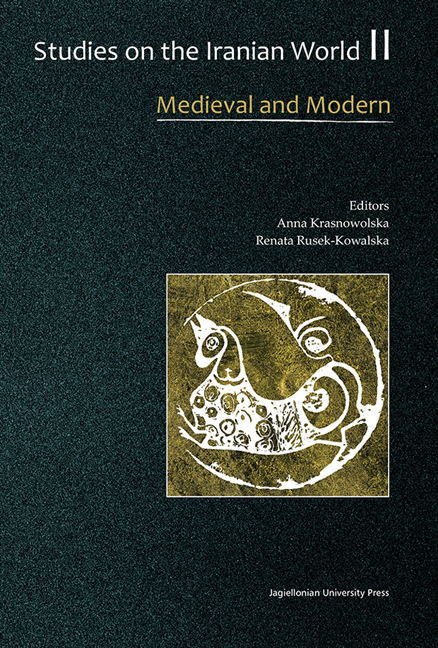Book contents
- Frontmatter
- Contents
- Foreword
- Linguistics
- Literature
- Religion
- History
- The Failure of the Constitutional Monarchy in Iran: The Socio- and Psycho-Genesis of Reza Khan's Rise to Power
- Concerning One Unpublished Persian Historical Document from Afshar Period
- Clash or Compromise? Mongol and Muslim Law in the Ilkhanate (1258–1335)
- New Insights on the Fiscal System of the Early Ilkhanids through the Analysis of al-Murshid fī al-Ḥisāb, an Unknown Accounting Manual
- Archaeological Survey of Kamar-e Marj Castle in Kermān Province
- Historians of their Time: Mongols, Mamluks and the Treatment of the Past
- Arts
- Social and Cultural Studies
Archaeological Survey of Kamar-e Marj Castle in Kermān Province
from History
Published online by Cambridge University Press: 12 January 2018
- Frontmatter
- Contents
- Foreword
- Linguistics
- Literature
- Religion
- History
- The Failure of the Constitutional Monarchy in Iran: The Socio- and Psycho-Genesis of Reza Khan's Rise to Power
- Concerning One Unpublished Persian Historical Document from Afshar Period
- Clash or Compromise? Mongol and Muslim Law in the Ilkhanate (1258–1335)
- New Insights on the Fiscal System of the Early Ilkhanids through the Analysis of al-Murshid fī al-Ḥisāb, an Unknown Accounting Manual
- Archaeological Survey of Kamar-e Marj Castle in Kermān Province
- Historians of their Time: Mongols, Mamluks and the Treatment of the Past
- Arts
- Social and Cultural Studies
Summary
SUMMARY
Iranian mountain castles were historically invaluable because of their role in protecting borders, routes and natural resources.
This survey concentrates on Kamar-e Marj mountain castle in Kermān province, South-Eastern Iran, located to the North-East of Šahr-e Bābak and near Rafsanjān. The castle's potential in defending its surrounding areas and routes is analyzed on the basis of classical texts and field archaeology accompanied by geographical and linguistic studies. The main aim of this paper is finding why the five-hectare castle was located in such a remote area. Periods of settlement and activity have already been identified by systematic surveys of surface data like slag, lithic and, especially, pottery shards. By considering the available evidence, it is possible to argue that Isma‘ilis once used the castle, mainly before the establishment of the Isma‘ili state in Alamut and Kuhestān. The remoteness could therefore be explained by the sect's need for concealment.
HISTORICAL AND GEOGRAPHICAL CONTEXT
From the remotest times in history until the last couple of centuries, mountain castles and military fortifications in Iran enjoyed a special status. This was mainly due to their important, strategic role in capturing new territories and protecting the sovereignty of the domain. Due to their geographical importance, these structures had different functions and purposes at different eras and locations, which went beyond military functions and included the protection of frontiers, roads, large cities or natural resources.
Spread over an area of 47,650 m2, Kamar-e Marj is among the largest mountain castles in Iran. Considering its special features, and bearing in mind different political and economical conditions of various periods, this castle could have been used for a number of the above objectives.
This article deals with the reasons for the formation and intended function of such a large castle in a region, which is now a remote village in the administrative district of Šahr-e Bābak in the province of Kermān, Iran. However, since there are only a few relics remaining and as it is difficult to determine the castle's dimensions, efforts were made to identify, as far as possible, its various functions and periods of occupation. The dispersion of bricks and mortars over the castle area bear witness to the existence of a building or a number of buildings on the mountain, of which now no data remains.
- Type
- Chapter
- Information
- Studies on the Iranian WorldMedieval and Modern, pp. 205 - 218Publisher: Jagiellonian University PressPrint publication year: 2015



